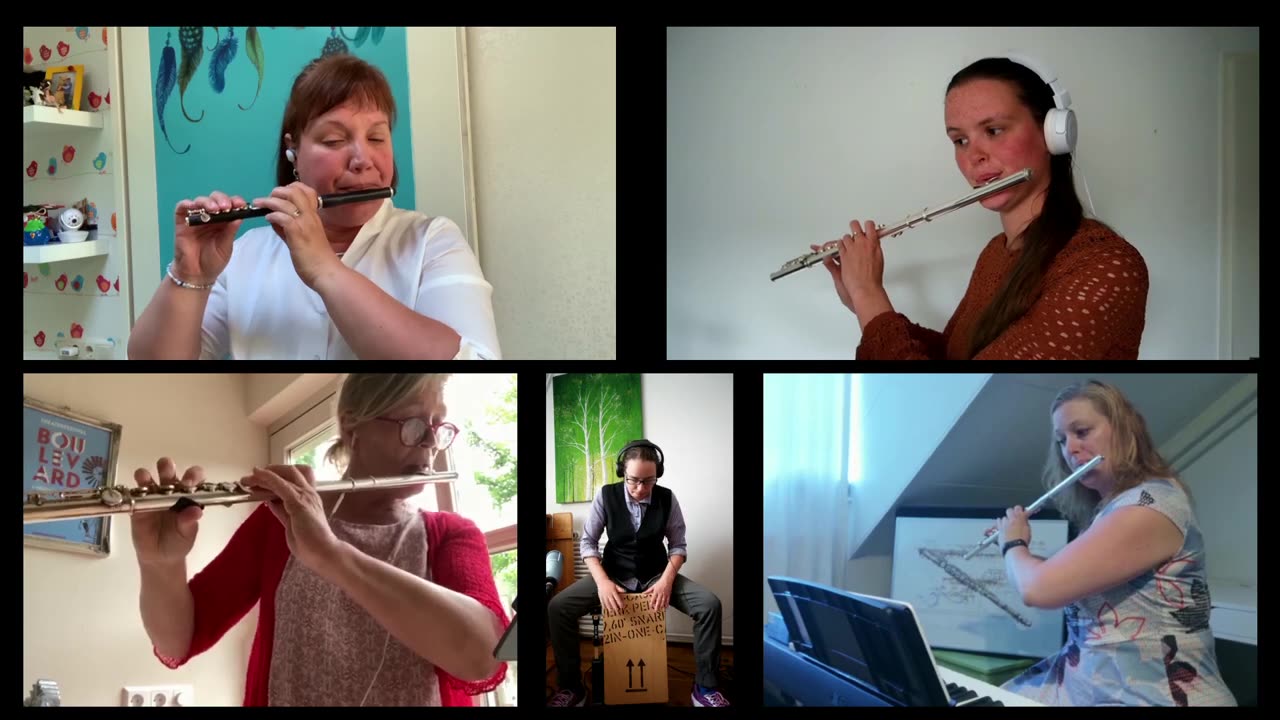Premium Only Content

Three flutes and a piccolo - There's always sound (even when the walls are crumbling down)
Piccolo: The main instrument of focus, a small flute-like instrument known for its high-pitched and bright tones.
Woodwind: Refers to a family of musical instruments that produce sound by blowing air through a mouthpiece or reed, including the piccolo.
Flute Family: The piccolo is a member of the flute family and is known for its distinctive, piercing sound.
High Register: The range of pitches in which the piccolo excels, producing bright and piercing notes in the uppermost register of the musical spectrum.
Orchestral Music: Music composed for and performed by orchestras, where the piccolo often adds its unique timbre to the overall sound.
Marching Bands: Piccolos are often used in marching bands due to their ability to cut through outdoor environments.
Solo Piccolo: Music composed specifically for a solo piccolo player, showcasing the instrument's agility and brilliance.
Piercing Tone: The characteristic sound of the piccolo, which stands out due to its high pitch and bright timbre.
Transposition: The piccolo is a transposing instrument, which means its music is written at a different pitch than it sounds.
Ensemble Playing: Piccolos are frequently part of larger ensembles such as orchestras, wind ensembles, and concert bands.
Piccolo Flute: Another term sometimes used for the piccolo due to its close relationship to the flute.
Extended Techniques: Unconventional playing methods used to expand the sound palette of the piccolo, such as flutter tonguing, multiphonics, and harmonics.
Marches: Piccolos are often featured in military and ceremonial marches due to their distinctive sound.
Double Tonguing: A technique used to play rapid passages on the piccolo by alternating between two different tongue articulations.
Piccolo Concerto: A musical composition featuring a solo piccolo player accompanied by an orchestra.
Piccolo Embouchure: The specific way in which a musician shapes their lips and blows into the piccolo's mouthpiece to produce sound.
Coloratura: Fast and virtuosic passages often played by the piccolo to add ornamentation and flair to a piece.
Fife: A historical instrument similar to the piccolo, often associated with military music and traditional folk tunes.
Piccoloist: A musician who plays the piccolo, skilled in producing its distinctive high-pitched sound.
Piccolo Repertoire: The collection of music pieces that are played by piccoloists, spanning various genres and styles.
-
 3:03:44
3:03:44
The Why Files
4 days agoCOMPILATION: Pyramids, Mounds and Mountains
161K85 -
 2:00:15
2:00:15
Badlands Media
1 day agoThe Liberty Den Ep. 131: Swamp Exodus, Elon’s Baby Mama Drama, and Friday Night Shenanigans
149K38 -
 2:05:26
2:05:26
TimcastIRL
15 hours agoTrump NUKES IRS, Mass Fed Layoffs, Democrats REVOLT Over 200k Layoffs w/Roma Nation | Timcast IRL
165K216 -
 1:39:03
1:39:03
Roseanne Barr
18 hours ago $37.26 earnedAdam Carolla! | The Roseanne Barr Podcast #87
155K43 -
 1:29:04
1:29:04
Glenn Greenwald
18 hours agoTrump, Vance & Musk Announce a Radically New Foreign Policy Framework; Prof. Norman Finkelstein on Gaza's Future, the Cease-Fire Deal & Fallout from the U.S./Israeli War | SYSTEM UPDATE #407
210K109 -
 4:15:00
4:15:00
Nerdrotic
20 hours ago $58.13 earnedCaptain Falcon America REVIEW, Disney Ending DEI? Rings of Power RETURNS | Friday Night Tights #341
252K49 -
 9:34:03
9:34:03
FusedAegisTV
1 day agoMario Galaxy, Batman, Real Talk/Politics, & MORE - V-Day 💗 Friday Variety Stream!
87.8K1 -
 1:10:49
1:10:49
Vigilant News Network
16 hours agoRFK Jr. Drops a Stunning Announcement | The Daily Dose
103K55 -
 49:49
49:49
Candace Show Podcast
19 hours agoEXCLUSIVE: Blake & Ryan’s Desperate Legal Strategy Exposed! | Candace Ep 147
214K144 -
 1:32:20
1:32:20
2 MIKES LIVE
17 hours ago2 MIKES LIVE #180 with guest Kyle Rittenhouse!
66.4K4